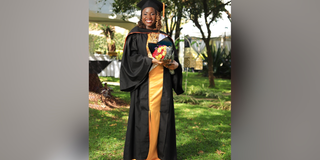
Graduation day in Kenya has transformed from a simple family milestone into a high-stakes social spectacle.
The champagne pops, designer gowns sparkle, and professional photographers capture every moment – but at what cost? It’s that time of the year again where graduation gowns litter city and town streets across Kenya.
Graduation day in Kenya has transformed from a simple family milestone into a high-stakes social spectacle where students are willing to spend more on a single day's celebration than some families' annual income.
Gone are the days of modest ceremonies with a handful of proud relatives. Today's graduates are turning their academic achievements into elaborate productions that can easily exceed Sh200,000 – a price tag that would make even wedding planners blush. Professional photo shoots, luxury venues, designer outfits, and Instagram-worthy after-parties have become the new benchmark of success.
But beneath the glitz and glamour lies a complex story. Is this surge of extravagant graduation celebrations a genuine expression of hard-earned achievement, or a performance driven by social media pressure and the relentless need to showcase personal triumph?
In this week's MyNetwork, we dive deep into the economics and psychology behind Kenya's graduation celebration phenomenon, uncovering the true cost of turning an academic milestone into a viral-worthy event.
The desire to make a statement
For Victoria Momanyi, 23, a recent graduate of Daystar University, the decision to spend a high six figure amount on her graduation was about more than just celebrating her academic success—it was about making a bold statement.
“First of all, I wanted to look good on my graduation. That is something I've always said ever since I got to university,” Victoria reflects. “I've always imagined it would be a nice, expensive, and bougie day, and I definitely wanted to look nice.”

Victoria Momanyi, 23, a recent graduate of Daystar University, spent a six figure on her graduation to make a bold statement and create lasting memories with family and friends.
Victoria's lavish spending covered a wide range of expenses, including multiple outfits for various graduation events—a dinner, the ceremony itself, and a homecoming party. “Some of the major expenses I had during my graduation period were my outfit, which was quite expensive,” she says. One of her most significant expenses was her graduation party. “I had two parties—one in Nairobi and another one back at home in Kisumu,” she adds. Her commitment to looking good and hosting memorable events made the costs add up quickly.
Like many other graduates, Victoria was driven by the belief that graduation is a once-in-a-lifetime event. “Hair, wigs, and décor are very expensive, and though some expenses might seem small, they add up to a huge amount of money,” she explains. To cover these expenses, Victoria relied on both her personal savings and support from her parents. “I had saved up to around Sh40,000 for my graduation expenses. This helped me cover the smaller expenses like my personal look, while my parents supported me with the larger expenses.”
“I had to get two wigs for the graduation dinner and the day, which cost me Sh6,000 each, so that added up to Sh12,000. My dresses for the graduation dinner and ceremony took almost a month to get ready. I had to customise my suits, and my makeup was another big expense. I struggled to find a makeup artiste who could get my look right, so I had to hire two makeup artistes for different days. These artistes came highly recommended, but their services were pricey.”
Victoria also highlights the costs of other essentials, including shoes, which she purchased first before finalising her outfits. Her friends travelled from Nairobi to attend the homecoming party which raked up the costs. “There were costs for accommodation and transportation for my friends. The second graduation after-party was just as important to me, so I wanted to make sure everything was perfect.”
Victoria’s story is not uncommon among Kenyan graduates, where a mix of personal savings, family contributions, and social expectations drives many to go all out for graduation celebrations.
Family support and financial planning
For many Kenyan graduates, family support is essential in managing the financial burden of an extravagant graduation. In Victoria's case, she acknowledges that her parents handled most of the significant expenses, allowing her to focus on the smaller, personal costs. “Like I said, I've been saving up for years for this day. I let them take care of the big expenses, but the smaller ones, like my personal look, were all on me.”
Similarly, for June Atis, who is about to graduate with a bachelor's degree in Education, family support will come in handy. For food, June has a budget of Sh150,000, which will go entirely toward a venue and food at Sarova Woodlands in Nakuru for a party of around 35 people. “The number of people who have already sent their RSVPs is around 50, consisting of mostly family, including extended relatives, my church family, and friends,” she shares.
June’s party is being funded by her parents, while she is using her savings to cover her personal expenses. “I'm using part of my savings, around Sh35,000, for things like my suit and hair,” June says. For her, graduation is a significant moment, not just for herself but for her family. “For my parents, it's a big deal because I’m the first child to graduate from university, so they wanted to make me feel special.”
Social media pressure and self-expression
In today’s digital age, platforms like TikTok, Instagram, and X have become central avenues for self-expression, and this has added immense pressure to elevate major life events, including graduations. For many young graduates, the desire to stand out and share their special day with a large audience online is driving up the costs of these celebrations, with some going to extraordinary lengths to outshine their peers.
Lisa Marie Kute, 24, spent over Sh150,000 on her graduation after-party food—a figure that raises eyebrows but, in her view, was justified by the influence of social media. “I didn't want a basic graduation after-party,” Lisa admits. “Seeing what my friends were doing online definitely influenced my plans because I didn't want to be like everyone else.”

Lisa Marie Kute's graduation was shaped by social media influences, focusing on quality food and a carefully curated guest list for a unique experience.
Lisa was keen on creating a distinct and memorable event, with a significant chunk of her budget dedicated to curating a unique experience. The guest list was a primary driver of the costs. “We ended up inviting around 250 people. The more people you invite, the larger the venue you need, and of course, that means more food and drinks,” she explains.
The culinary experience, a focal point of the after-party, was another cost driver. Lisa didn’t settle for the usual fare of rice and stew; instead, she wanted to offer her guests something special. “We had a live roasting station where we served goat, chicken, and even fish—something you don’t often see at these types of events,” she says. “We wanted our guests to have a unique, flavourful experience, and we weren’t willing to compromise on that.”
On top of the food, Lisa also spent considerably on decor, including tents, chairs, tables and elaborate centerpieces. “These things add up fast,” she notes, recalling how her initial budget was quickly surpassed. Still, she believes it was worth it: “I didn’t expect the costs to be so high at first, but my parents were willing to help, and I eventually stopped stressing about it.”
Despite the hefty price tag, Lisa has no regrets. “The experience was priceless. My family had never seen anything so glamorous, and it felt amazing to share that with them. Seeing their joy made all the money we spent feel insignificant,” she beams.
Is it all worth it?
For graduates like Lisa and Victoria, the expenses seem justified by the joy and memories created. “I would tell anyone, if you want to go all out for your graduation, do it—because no one knows what you’ve been through in university,” Victoria asserts. She recalls the day with fondness: “It was a day where I felt genuinely happy from the bottom of my heart.”
Lisa echoes this sentiment, noting that seeing her parents so proud made all the spending worthwhile. “It was about the experience and the memories we made together,” she says.
However, not everyone agrees with this approach. While June appreciates her parents’ efforts, she cautions others not to overextend themselves financially. “If you can’t afford a big event, don’t feel pressured. What’s important is being with the people you love and making memories with them,” she advises.
The broader impact on society
The trend towards extravagant graduations reflects broader societal changes in how milestones are celebrated in Kenya. This shift comes with financial implications, particularly for young graduates stepping into a challenging job market. “Right now, I don’t feel the financial strain because my parents covered most of the expenses,” June admits. “But I know that moving forward, I’ll have to be more mindful of my spending.”
While Lisa and Victoria were able to indulge in their dream graduations, they both acknowledge the importance of budgeting and being financially realistic. “It’s important to work within your means,” Victoria advises. “At the end of the day, what really matters is the people around you and seeing your name on the graduation list.”
A celebration of hard work
Lizzie Mumbi, a Daystar University graduate with a Bachelor of Arts in Communication, was among the many young Kenyans who went all out for a grand graduation celebration. For her, the event was not just about extravagance but a tribute to the people who supported her through her academic journey. Spending over Sh100,000 was a way of expressing gratitude to her loved ones. “One of the main factors that influenced my spending was my guest list,” she shared. “This was a significant achievement for me, and I wanted to celebrate with those who had been there for me throughout my studies.”

Lizzie Mumbi Waweru celebrated her graduation with a personalised menu and exclusive décor, investing over Sh100,000 to create a memorable experience for her over 50 guests.
Lizzie’s celebration included a customised menu featuring a whole mbuzi (goat) and a buffet for more than 50 guests. The food alone accounted for almost Sh70,000 of her budget. “I didn’t want to limit the food; it’s a festive occasion, after all. By customising the menu, I ensured that my guests got what they enjoyed, and it was much more affordable than the standard buffet price per person,” she explained.
Other major expenses included venue costs, décor, sound (the sound system) and entertainment. Lizzie opted for a venue that required payments for both the location and a DJ, further adding to her overall costs. For décor, she brought in a specialist to help achieve the aesthetic she had envisioned, noting that the venue only provided basic decorations.
For Lizzie, the financial commitment was a reflection of the hard work it took to earn her degree. “You work hard for four years, pulling all-nighters and studying for exams. I believe the celebration should match that effort. Hard work deserves to be celebrated in a big way,” she said passionately.
She found the investment worthwhile, not just for the event itself but for the memories created. “The sense of achievement and shared joy was worth every shilling.”
Social pressures and personal choices
Lizzie also acknowledged the role social pressure plays in influencing graduation spending decisions. “Yes, there is social pressure, but it’s selective. It depends on whether you let it affect you,” she noted. She revealed that she and her friends, who graduated the same year, had similar budgets of Sh100,000 or more and even shared tips on getting better deals for décor and venues.
However, she emphasised that spending lavishly is a personal choice. “You can have a simple ceremony with just your family, or you can go big. It’s about what feels right for you.”
Regarding whether this trend is sustainable, Lizzie believes it reflects a larger shift among young people, particularly Gen Z. “We’re learning to appreciate ourselves more. People might think we’re wasting money, but they don’t understand the sacrifices we’ve made to get here. Celebrating big is a way of acknowledging those sacrifices.”
Her advice to others planning graduation celebrations? “Start planning early. As soon as you know you’re graduating, begin saving and coordinating with family and friends. This will help you avoid the last-minute rush and ensure you get the best options for venues and décor. Most importantly, make sure it’s a celebration that makes you happy.”
Graduation glamour
In addition to the event planning, Lizzie’s graduation day attire was thoughtfully chosen. “My dress was all about confidence and comfort,” she said. With rain expected on the day of the event, she needed something practical but also beautiful. “This is your day—you need to celebrate yourself and look the part. You need to be your own cheerleader,” Lizzie said, stressing the importance of feeling good in what you wear.
In preparation, Lizzie and her girlfriends created a WhatsApp group called “Graduation Prep” to coordinate details for their outfits, nails, hair, makeup, and more. Each person took on a specific responsibility, and Lizzie was in charge of makeup for the group. They collaborated on everything, from choosing dresses to finding the right makeup artist, ensuring the big day went off without a hitch.
James Mwai, a 25-year-old graduate from Egerton University, shared his reflections on the financial and personal decisions surrounding his graduation. For him, spending around Sh60,000 on his grooming was influenced by the desire to celebrate this once-in-a-lifetime achievement. The moment was significant since he might not experience another graduation unless he pursued further studies.

James Mwai, 25, a recent graduate from Egerton University, spent a considerable amount of his grooming on his graduation event.
“This was my graduation, and I believe it happens only once,” he noted, adding that it was crucial to make the day special for himself.
James costs included a suit from Aspire Africa for Sh12,500, shoes at Sh4,500, and transportation from Nakuru to Nairobi, which cost about Sh15,000. The total, which included other items like a watch and accessories, amounted to almost Sh60,000. He stressed the importance of spending within one’s means, saying, “Don't push yourself to the edge financially—spend what you can afford.” For James, the financial commitment was about making his graduation memorable, especially given the challenges he faced during his studies, such as delayed graduation due to missing units.
For James looking good on his special day was important, not just for himself but also for his family and friends, who were surprised and delighted to see him in a suit for the first time. “It was something they won't forget,” he shared, noting how graduation allowed him to showcase a different side of himself to those close to him.
“Don't force yourself to things that you can't afford,” James said.
For those planning their graduations, his advice was simple: treat yourself within your means. “Whether you're wearing jeans and a jersey, the gown and graduating is what matters,” he concluded, saying that the degree and the memories are what truly count.









